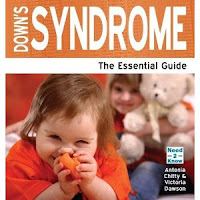Down Syndrome and Health Care
Vee Prasher and Beryl Smith
2002 ISBN 1 902519 20 5
This book provides practical information for staff, families and other carers on the important health issues for adults with Down syndrome. Specific medical issues are covered including:
vision
hearing
heart and circulation
respiratory conditions
skin conditions
skeleton, joints and dental care
The book also covers personal and social issues and includes a resources section with sources of further support and information.
Down Syndrome Issues and Information Complete Education and Development Pack (0-16 Years)
Designed to support education and development from birth to 16 years, this package of books includes a wealth of information covering many areas of development and education for children with Down syndrome. Topics covered include speech and language, reading and writing, memory, motor and number skills development. The package includes checklists for recording individual progress.
Down’s Syndrome and Dementia: for carers and support staff
Karen Dodd, Vicky Turk and Michelle Christmas
2009 ISBN 978 1 905218 08 0 Price £20.00
A resource book for family carers, staff and other professionals to help them care more effectively for people with Down’s syndrome and dementia.
The book focuses on practical day to day issues, including:
supporting the person with Down’s syndrome and dementia to maintain skills and independence in every way and for as long as possible
treating treatable conditions
understanding and responding appropriately to changes in behaviour during the early, middle and late stages of dementia
providing emotional reassurance for carers
improving the confidence of carers to look after individuals
identifying local supports and resources
being open to the problems that may arise and help with coping
tips and solutions
The book has been revised to take into account further developments both in working with people with learning disabilities in general and specific developments for people who develop dementia.
Down Syndrome: Neurobehavioural Specificity [Paperback]
Jean-Adolphe Rondal PhD (Author), Juan Perera (Author)
People with Down Syndrome show a specific developmental profile with strengths in social understanding and visual learning and memory, and more difficulties with motor processes, speech and language, and auditory-vocal short-term memory. It is important that parents, practitioners and teachers know this and adapt interventions and educational approaches to take account of this particular profile.
This is the only book to date that explains the developmental profile of people with Down Syndrome from its many different angles. It covers a range of perspectives, including the biology, psychology, speech and language, health care, and social competence of both children and adults with Down Syndrome. All the information is gathered and placed in the context of the neuro-genetic science that is developing around this area.
Internet Resource – Brighter Tomorrows
This program is designed to help answer your questions, educate you about Down syndrome and share the stories of other parents in similar situations. Please choose your starting point:
Fine Motor Skills in Children With Down Syndrome: A Guide for Parents and
Professionals (Topics in Down Syndrome)
[Paperback] Maryanne Bruni (Author) 1998 ISBN-13: 978-1890627034 "An invaluable resource for families and professionals, and a great companion to the previously published book, Gross Motor Skills in Children with Down Syndrome. The author's suggestions for encouragement of fine motor skill development make use of common household materials that are accessible to all families. I particularly like the 'Grandma's and Grandpa's Lists' at the end of most chapters, which give gift ideas that are fun as well as educational." -- Bonnie Patterson, M.D., Director, Down Syndrome Clinic, Cincinnati Center for Developmental Disorders
TUESDAY'S CHILD
‘In every life there is a defining moment; Caoimhe’s diagnosis was mine . . .’
‘Caoimhe today is as beautiful, as unblemished, as she was at the hour of her birth, before she was stamped and branded. She is bigger than any label. When I look at her I am as in love with her as always... there are times when I see her and I still catch my breath; the feeling is so intense it is painful. That pain, I know now, belongs to love, to grief, to loss, to the disappointment of mortality, and it will never go away. But I don’t want it to. Sadness is not the worst thing I can feel.’
When journalist Kathy Evans wrote what was to become an award-winning series of articles about the birth of her third child, Caoimhe (pronounced Keeva), she was inundated with responses - not just from other parents of disabled children but also from parents-to-be, relatives, teachers, doctors and many others who urged her to keep writing because they wanted to know more.
Down's Syndrome: The Essential Guide (Need2know) [Paperback]
Antonia Chitty (Author), Victoria Dawson (Author)
Publisher: Need2Know (1 Jun 2010)
Language English
ISBN-10: 1861440839
Contact the library to order articles, borrow books, help with research.


.gif)










